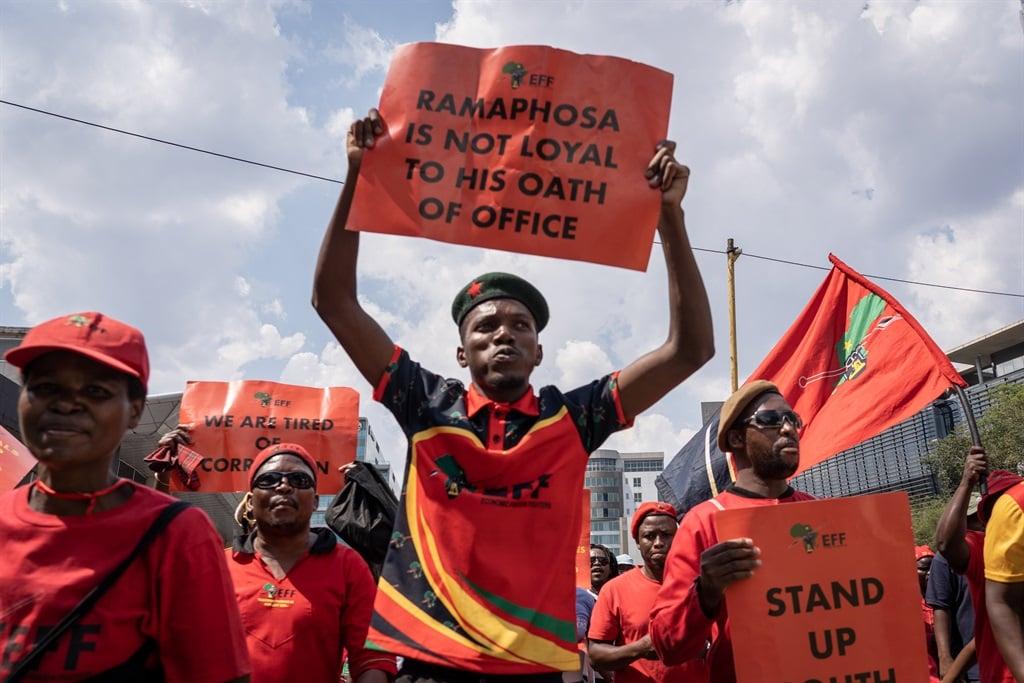Africa-Press – South-Africa. The protests the EFF organised during their ‘national shutdown’ were embarrassingly small, much smaller than protests that we have seen in recent years by students, unions and grassroots activists. Where the EFF does succeed is in the media, argues Imraan Buccus.
The EFF’s ‘national shutdown’ failed to attract significant support and seriously damaged the organisation’s credibility. It is now clear that the EFF is like the Zuma administration, a strange beast: a populist organisation that isn’t actually popular.
A true populist organisation gathers mass support, whether from the left of the right, by speaking in the name of the people. The EFF have minor electoral support, and now, we can all see, no capacity to mobilise even medium size street protests. The protests that they did organise during their ‘national shutdown’ were embarrassingly small, much smaller than protests that we have seen in recent years by students, unions and grassroots activists.
Where the EFF does succeed is in the media. Several people over the years have made the point that the EFF is a minor party in terms of votes but a major party in terms of media attention.
Media attention not turned into support
Like other populist formations, like for instance Donald Trump, they get media attention by saying outrageous and threatening things. But unlike Trump, the EFF can’t turn this attention into significant support at the polls. This raises an interesting question for the media. Do they continue to give the EFF outside attention because readers will click on stories that shock or frighten them? Or do they treat the EFF as what they are, a small party that has not been able to demonstrate widespread support on the streets?
Commercial pressures would encourage the first approach. Political seriousness would encourage the second. In many countries, such as Italy, outrageous statements by populist politicians have generated huge media coverage that has, in turn, generated rapid growth in electoral support. Here in South Africa, this is not happening.
Moreover, after the failure of the EFF to mobilise meaningful popular support during its failed ‘national shutdown’, it is now clear that massive media attention is not translating into popular support on the streets. But the danger of allowing EFF leader Julius Malema to set much of the media agenda by giving outsize coverage to his often outrageous and sometimes thuggish comments is that other rational voices are crowded out.
Even if ten percent of the reporting in advance of the failed ‘shutdown’ had instead been dedicated to an important issue, such as the unemployment crisis or the debates around a basic income grant, we could have made some advance in better understanding our crisis and possible ways to improve our society. This danger of populist political posturing crowding out more serious voices is not taken seriously enough.
Serious issues and challenges
South Africa has a rich array of academic experts, committed activists of various kinds and some very good journalists who could do deep-dive work if given the space and resources. It is the duty of all of us to work as hard as we can to enrich the public discussion, but when Malema’s threats and crudites take up all the space there just isn’t room for more valuable forms of reporting and analysis.
Malema and the EFF should be reported on and analysed fairly and accurately. But a ten percent party with no real capacity to mobilise support on the streets should not get the lion’s share of reporting just because it has made more empty threats.
Our country faces very, very serious problems. Millions are unemployed, and many of the unemployed are going hungry; our basic infrastructure is falling apart; skilled people are leaving at a frightening rate and our president has shown a complete failure to lead.
At the same time, there is an alarming rate of violent crime, and the cancer of corruption continues to eat away at society, robbing future generations of hope. The crisis of political assassinations continues to escalate. We need serious, well-informed, rational and wide-ranging discussions about all of this.
Failure of shutdown has exposed Malema
Every time we give Malema more space than he deserves in our tv reports, newspapers and online media, we are taking space away from this important work. Now that the failure of the ‘national shutdown’ to attract any sort of meaningful support has so thoroughly exposed Malema and his party for the charlatans that they are, let’s move on to the serious business of finding ways to rebuild our collapsing society. If we can’t do this and we keep giving our most valuable airtime to the cynical ravings of a reckless populist, we will only contribute to the general decay of the level of public discussion and debate.
Let’s instead focus on our people than a populist who speaks in their name but doesn’t have their support. Let’s have our best economists debate the economic crisis, deep dive reports into the lived experience of unemployment, interviews with our best activists and so on.
Let’s get to know the nurses working against the odds in our decaying public health care system. Let’s get to know the school teacher doing a brilliant job under trying circumstances. Let’s have a careful debate about the wisdom of privatising our electricity system. Let’s take ourselves and our society seriously.
Yes, media has to make money, but there are other ways of getting subscriptions, clicks and eyeballs on screens than giving unwarranted airtime to someone like Malema. It just requires a bit of creativity, some investment in newsrooms and some confidence in the better nature of most South Africans.
– Dr Imraan Buccus is a political analyst and senior research associate at ASRI.
For More News And Analysis About South-Africa Follow Africa-Press






